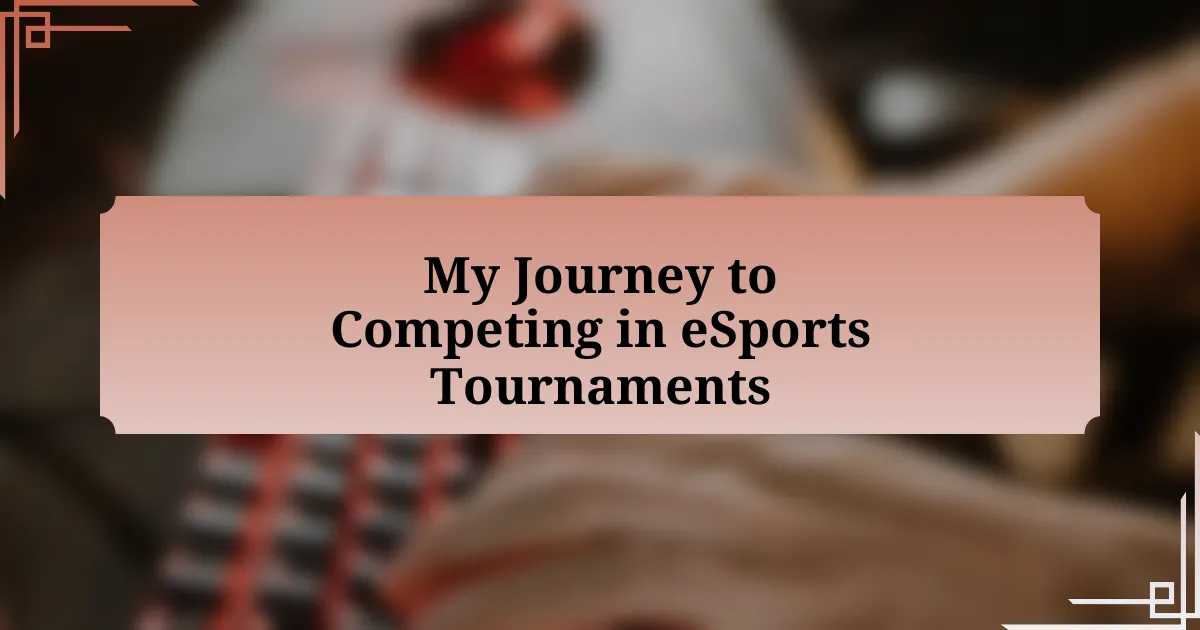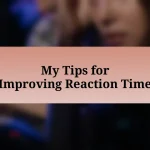Key takeaways:
- eSports has evolved from casual gaming to a professional arena, highlighting community, teamwork, and competition.
- Success in eSports requires a blend of mechanical skills, strategic thinking, communication, and mental resilience.
- Training regimens should include gameplay analysis, physical fitness, and effective warm-up routines for improved performance.
- Embracing failure as a learning opportunity and maintaining a balanced lifestyle are crucial for long-term growth in competitive gaming.
Author: Evelyn Hartley
Bio: Evelyn Hartley is an award-winning author known for her compelling narratives and richly drawn characters. With a background in psychology and literature, she weaves intricate tales that explore the complexities of human relationships and the intricacies of the human psyche. Her debut novel, “Whispers in the Dark,” was celebrated by critics and readers alike, earning her a dedicated following. Evelyn’s work has been featured in various literary journals and anthologies, and she frequently speaks at writing conferences and workshops. When she’s not writing, she enjoys hiking in the mountains and volunteering at her local animal shelter. She resides in Seattle with her two rescue dogs, Luna and Milo.
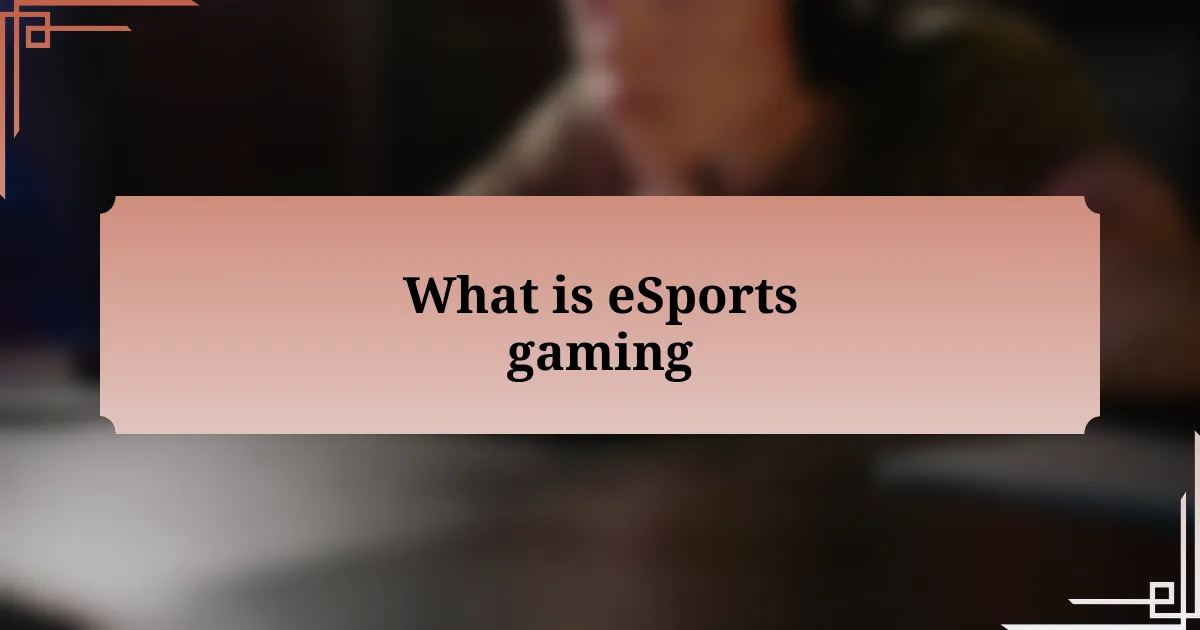
What is eSports gaming
eSports gaming refers to competitive video game playing at a professional level. This field has evolved dramatically over the years, transitioning from friends casually gaming together in a basement to massive international arenas filled with fans. I still remember the first time I watched a major tournament; the excitement of the crowd and the intensity of the players made me realize this was more than just playing games—it was a passion turned profession.
What makes eSports unique is the fusion of skill, strategy, and teamwork. Players often devote countless hours to honing their abilities, mirroring the dedication you’d find in traditional sports. Have you ever felt that thrill when pulling off a perfect move in a game? That’s the same rush these competitors feel, only amplified by the stakes of competition and the cheers from thousands of fans.
At its core, eSports is not just about winning; it’s about community. I recall discussing strategies with fellow gamers online, forming bonds over shared victories and defeats. These relationships create a supportive network akin to that of a sports team, which can be incredibly rewarding in an industry that emphasizes collaboration and camaraderie.
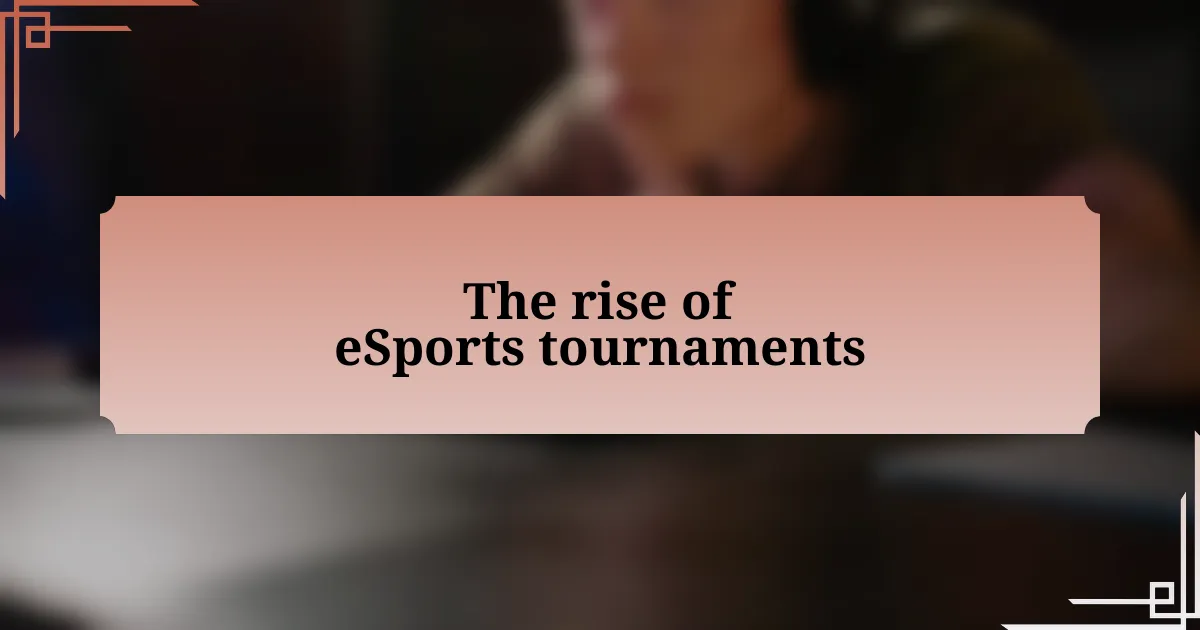
The rise of eSports tournaments
The rise of eSports tournaments is nothing short of remarkable. Just a decade ago, attending a gaming tournament often meant gathering in a small venue, with a handful of fans. Fast forward to today, and we’re witnessing sold-out arenas, millions tuning in online, and prize pools that rival traditional sports. I remember feeling awestruck watching a live stream of a major event, fans from around the world uniting to cheer for their favorite teams. The sense of shared excitement was palpable, highlighting how much the community has grown.
In my experience, the evolution of eSports tournaments reflects a shift in how mainstream culture views gaming. It was a defining moment for me when I attended my first large-scale tournament. The atmosphere was electric, filled with passionate fans sporting team jerseys, creating a vibrant tapestry of colors and sounds. This wasn’t just gaming; it was an experience that brought people together like a sports event, and I couldn’t help but wonder how the passion for gaming had transformed into a global phenomenon.
As sponsorships and mainstream media take notice, the future looks promising. I’ve seen teams grow from grassroots organizations to powerhouse brands, captivating audiences and influencing trends in gaming culture. It makes me think—what’s next for eSports tournaments? With technology advancing rapidly and new games emerging, the potential for even bigger events seems limitless. Each tournament tells a story of perseverance and teamwork, resonating deeply with both players and fans alike, and I can’t wait to see where this journey leads us next.
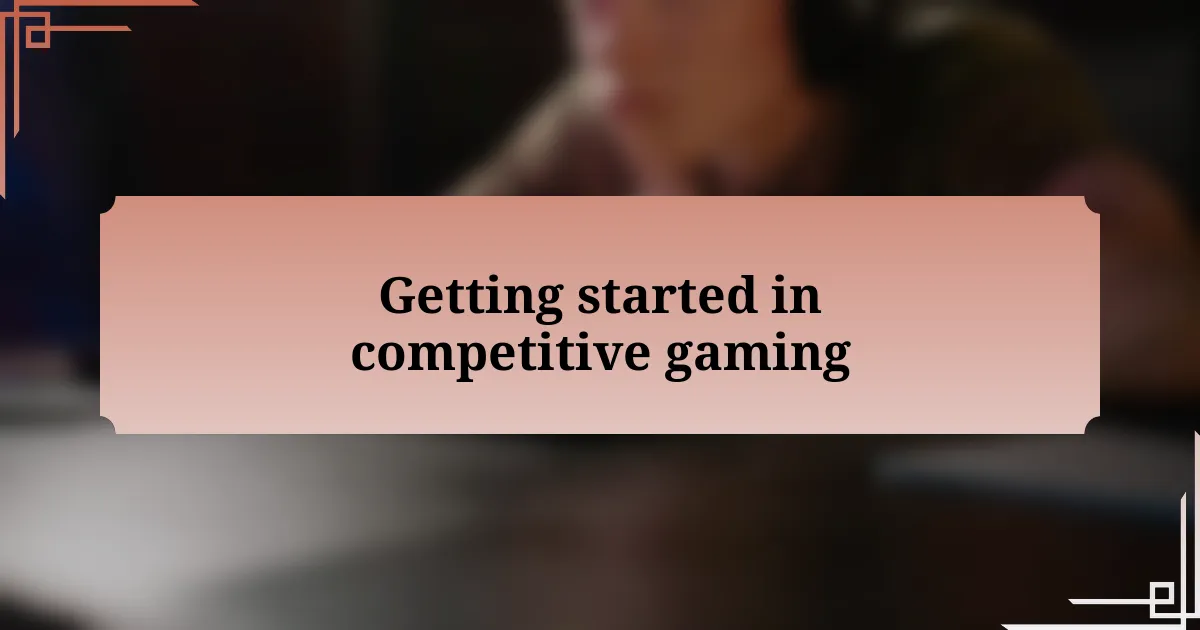
Getting started in competitive gaming
Getting started in competitive gaming can be an exhilarating yet intimidating journey. I recall my first steps into this world, nervously queuing up for my initial matchmaking games. The thrill of competing against others, combined with the anxiety of performing well, made my heart race. It really ignited something in me, pushing me to improve and to connect with fellow gamers who shared the same passion.
One important aspect of entering this sphere is finding the right community. I remember joining a local gaming group, where I met talented individuals who mentored me while also sharing invaluable insights. It was within that supportive environment that I learned not just the game mechanics, but also the strategies and dedication required to thrive in eSports. Have you ever felt that sense of belonging that helps fuel your motivation? For me, it was a game-changer.
As I dove deeper into competitive play, I quickly understood the significance of practice and discipline. I committed to a strict schedule, ensuring I spent time analyzing my gameplay and watching top players for inspiration. Each loss was hard, but it was equally rewarding to see my progress over time. It’s in those moments of grit and determination that I discovered true growth—something that I believe every aspiring competitor should embrace.
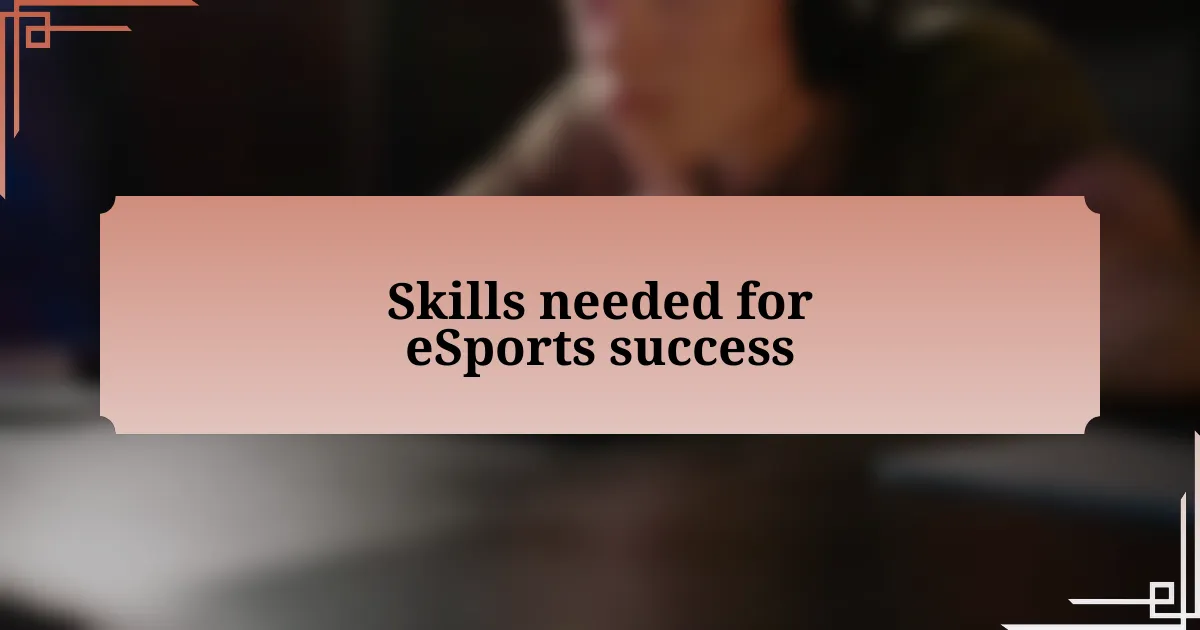
Skills needed for eSports success
To succeed in eSports, I believe a blend of mechanical skills and strategic thinking is essential. In my early tournaments, I often found myself overwhelmed during intense matches, but I realized that mastering game mechanics—like precision aiming and efficient use of abilities—was just half the battle. How many times have you been in a game where quick reflexes saved the day? It’s those crucial moments that highlight the importance of continuous practice.
Communication and teamwork also play a significant role in competitive environments. During one of my first team matches, I discovered that simply knowing how to play my character wasn’t enough; I needed to effectively communicate with my teammates to coordinate strategies. I remember feeling the rush of a well-executed play, where everything clicked because we were all on the same page. Have you ever felt that electrifying connection with your team? It’s a game-changer in high-stakes situations.
Lastly, mental resilience cannot be underestimated. There were days when frustration from losses threatened my passion for the game. I vividly recall a tournament where I lost back-to-back matches, leaving me disheartened. Yet, I learned to channel that disappointment into motivation. Maintaining a positive mindset and the ability to bounce back turns each defeat into an opportunity for growth. Isn’t it fascinating how failure can lead to stronger resolve? That’s a skill every competitor should cultivate.
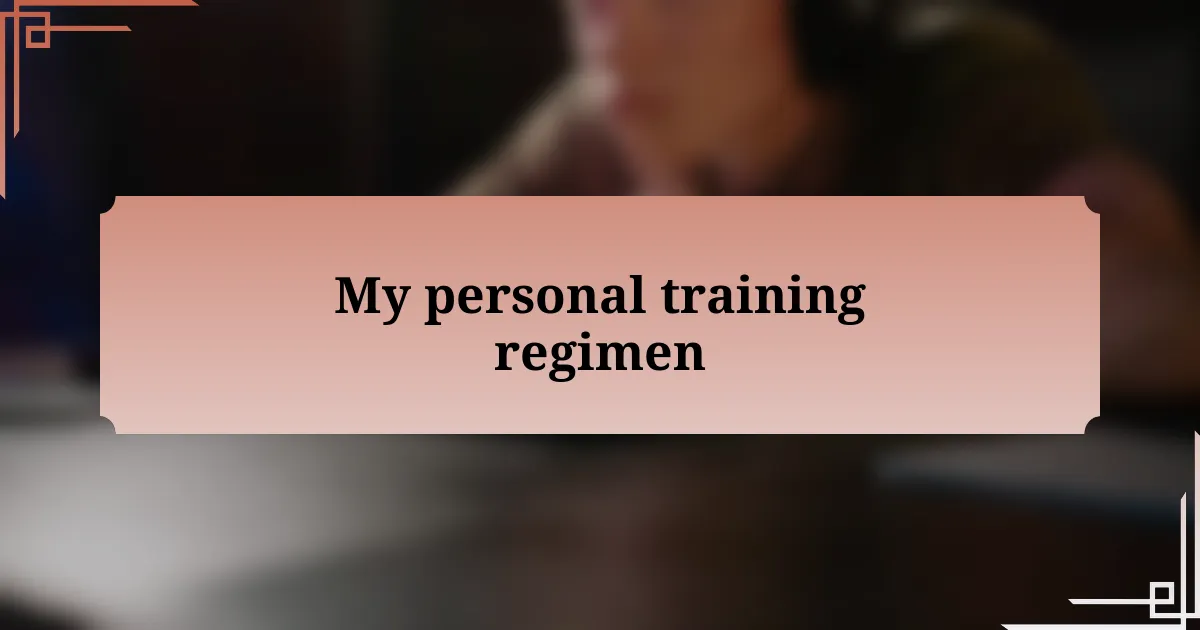
My personal training regimen
Training for eSports has become a key part of my routine, influencing my performance tremendously. I set aside dedicated time each day to practice, focusing not just on gameplay but also on analyzing my matches afterward. Have you ever reviewed a game just to realize the small mistakes that cost you dearly? That moment of reflection can turn frustration into valuable lessons, anchoring my growth.
Physical fitness plays a surprising role in my regimen as well. I began incorporating exercise into my daily routine—simple things like stretching and short cardio workouts. I found that staying active improved my focus and reaction times during gameplay. Isn’t it interesting how a clear mind and a healthy body can take you to new heights in a match?
Moreover, I prioritize warm-up routines before diving into intense practice sessions. This includes simulated drills to sharpen my execution and familiarize myself with the nuances of my characters. I still remember the time I felt like I was on fire after a solid warm-up; everything just clicked during the first few matches. Can you recall a time when you felt invincible? That’s what a proper warm-up can accomplish, boosting both your confidence and performance on the virtual battlefield.
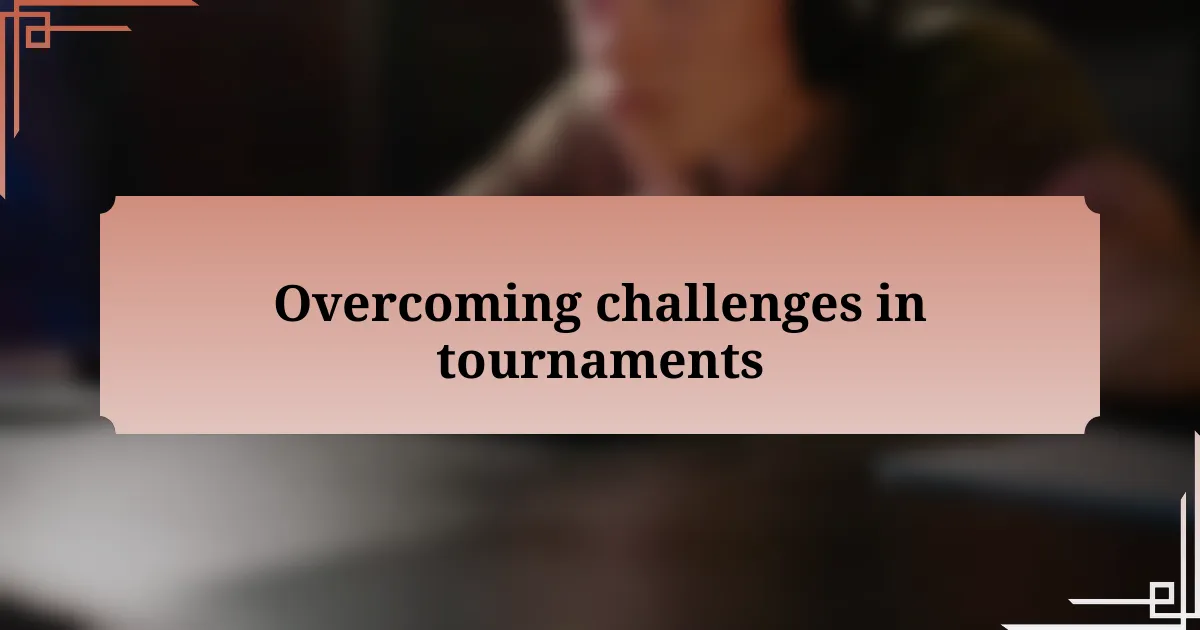
Overcoming challenges in tournaments
Competing in eSports tournaments isn’t just about skill; it’s also a test of mental resilience. I still remember my first major tournament, feeling the pressure not just from the competition but from my own expectations. The moment I stumbled in a crucial match, doubt set in. How often do we let one setback define our entire performance? I learned that shifting my focus to recovery rather than dwelling on mistakes made all the difference, keeping my mindset sharp for the rounds ahead.
I encountered technical challenges that seemed insurmountable during live events, like sudden lag spikes or even equipment failures. I recall a time when my headset malfunctioned right before a pivotal game. It was panic-inducing; how do you rally after something like that? I quickly communicated with my team and adapted to the situation, using my remaining time to mentally prepare and adapt strategies. From then on, I made it a point to have backup equipment and a contingency plan. These experiences taught me the importance of flexibility and quick thinking under pressure.
Then there’s the aspect of managing nerves and anxiety. Standing on that stage, with lights beaming and thousands watching, can be overwhelming. I found myself grappling with self-doubt before my biggest match. One strategy that really helped was visualization—picturing myself executing my strategies successfully in front of the audience. In those moments of doubt, have you ever turned to mental skills to reset your focus? That shift transformed my emotional state, allowing me to channel anxiety into a powerful competitive edge.
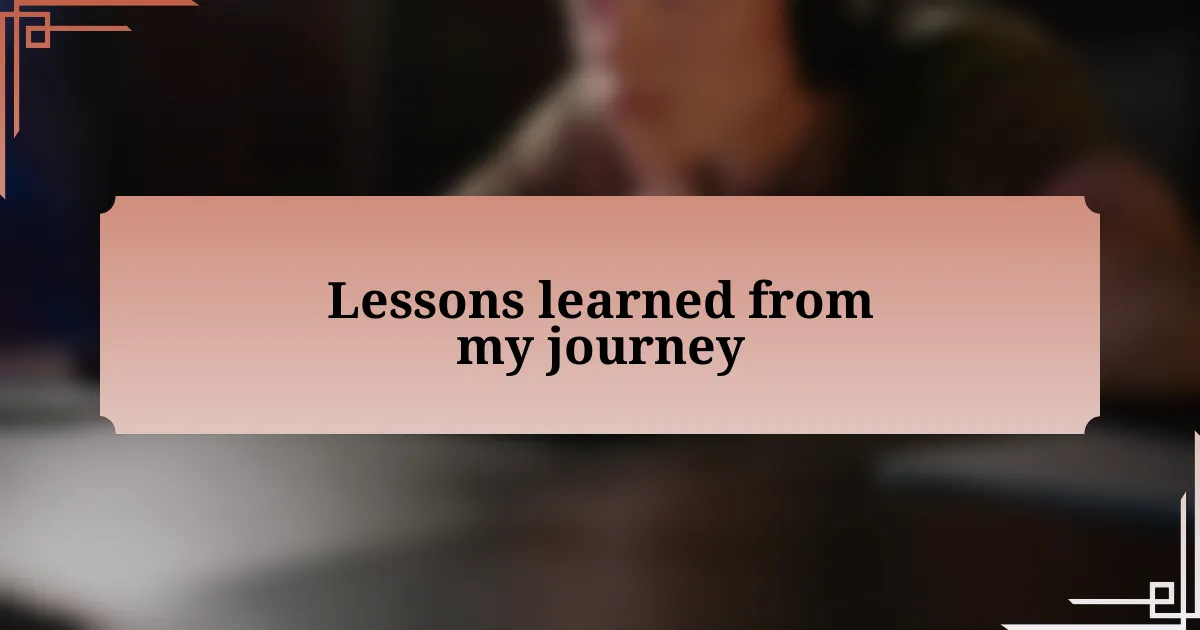
Lessons learned from my journey
Throughout my journey, I’ve learned that teamwork truly enhances individual performance. I can recall a time during a critical match when communication faltered, leading to a loss that felt devastating. Yet, it was in the post-game analysis where I realized the disconnection wasn’t just about strategy, but about understanding each other’s play styles. How often do we assume everyone’s on the same page? I discovered that fostering open dialogue with teammates can bridge gaps and lead to more cohesive gameplay.
Another significant lesson was the power of maintaining a balanced lifestyle. I remember diving deep into practice, thinking more hours equated to better performance. But fatigue began to creep in, dulling my reactions and creativity. The moment I prioritized rest and personal time, my gameplay sharpened remarkably. Have you ever experienced burnout? It taught me that taking breaks boosts not only my physical health but also rejuvenates my passion for the game.
One of the most profound insights came from embracing failure as a tool for growth. I remember feeling crushed after losing a potential championship title, replaying the moments that led to our downfall. Instead of viewing that loss as the end, I learned to dissect each misstep and view it as a lesson in resilience. How can we expect to improve without understanding what didn’t work? This mindset shift transformed my approach to each subsequent competition, allowing me to treat every loss as a stepping stone towards success.

